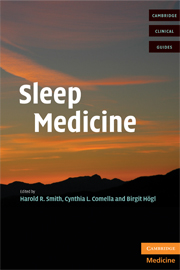Book contents
- Frontmatter
- Contents
- List of contributors
- Foreword
- SECTION 1 NORMAL SLEEP
- SECTION 2 SLEEP DISORDERS
- SECTION 3 SLEEP IN SPECIALTY AREAS
- 9 Sleep and neurologic disorders
- 10 Sleep and psychiatric disorders
- 11 Sleep and medical disorders
- 12 Sleep and pediatrics
- 13 Sleep and geriatrics
- 14 Forensic sleep medicine issues: violent parasomnias
- Index
- References
9 - Sleep and neurologic disorders
from SECTION 3 - SLEEP IN SPECIALTY AREAS
Published online by Cambridge University Press: 08 August 2009
- Frontmatter
- Contents
- List of contributors
- Foreword
- SECTION 1 NORMAL SLEEP
- SECTION 2 SLEEP DISORDERS
- SECTION 3 SLEEP IN SPECIALTY AREAS
- 9 Sleep and neurologic disorders
- 10 Sleep and psychiatric disorders
- 11 Sleep and medical disorders
- 12 Sleep and pediatrics
- 13 Sleep and geriatrics
- 14 Forensic sleep medicine issues: violent parasomnias
- Index
- References
Summary
Introduction
Sleep is a complex and colorful phenomenon, driven by different activities of the brain. Dysfunctions of the brain can change wakefulness and sleep and cause various sleep disorders. The details of these sleep disorders depend on the localization of the damage in the brain or other parts of the central nervous system. Almost every neurological disease is associated with sleep disorders. This chapter describes only a small selection of neurological diseases, those which are most strongly associated with sleep disorders.
Sleep and Parkinson's disease
The prevalence of sleep disorders in Parkinson's disease (PD) is estimated to be as high as 74–81%. Polygraphic sleep recordings in people with PD found decreased sleep efficiency, increased wake after sleep onset, and sleep fragmentation. Up to 80% of those with PD report having 2–5 awakenings per night. Sleep disorders in PD may be based on the neurodegenerative process, or they may result from nocturnal bradykinesia and rigidity, medication, psychiatric disorders, circadian rhythm disturbance, or REM sleep behavior disorder (RBD).
Parkinson's disease and sleep-disordered breathing
Sleep breathing disorders are common in PD. About half of all individuals with PD show obstructive sleep-disordered breathing. Rigidity, diaphragmatic dyskinesias, failure of autonomic control, and disorder of the mechanisms of breathing control can reduce the function of respiratory muscles and thus cause a restrictive respiratory dysfunction. Furthermore, abnormal movement in glottic or supraglottic structures, for example tremor-like oscillations and stridor during dystonic episodes, can cause intermittent closure of the upper airway.
- Type
- Chapter
- Information
- Sleep Medicine , pp. 157 - 169Publisher: Cambridge University PressPrint publication year: 2008

